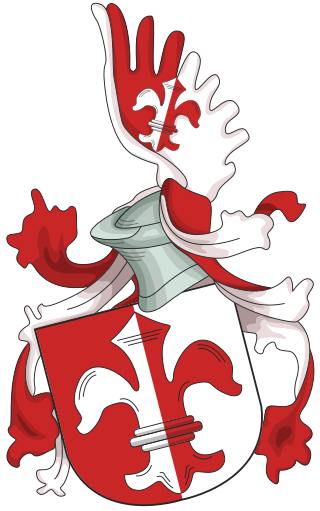Related Research Articles

Diego Velázquez de Cuéllar was a Spanish conquistador and the first governor of Cuba. In 1511 he led the successful conquest and colonization of Cuba. As the first governor of the island, he established several municipalities that remain important to this day and positioned Cuba as a center of trade and a staging point for expeditions of conquest elsewhere. From Cuba, he chartered important expeditions that led to the Spanish discovery and conquest of the Aztec Empire.

Maracaibo is a city and municipality in northwestern Venezuela, on the western shore of the strait that connects Lake Maracaibo to the Gulf of Venezuela. It is the second-largest city in Venezuela, after the national capital, Caracas, and the capital of the state of Zulia. The population of the city is approximately 2,658,355 with the metropolitan area estimated at 5,278,448 as of 2010. Maracaibo is nicknamed "The Beloved Land of the Sun".

Conquistadors or conquistadores is the term used to refer to Spanish and Portuguese soldiers and explorers who carried out the conquests and explorations of the Age of Discovery. Conquistadors sailed beyond the Iberian Peninsula to the Americas, Oceania, Africa and Asia, establishing new colonies and trade routes. They brought much of the "New World" under the dominion of Spain and Portugal.

Oriente was the easternmost province of Cuba until 1976. The term "Oriente" is still used to refer to the eastern part of the country, which currently is divided into five different provinces.

The Governorate of the Río de la Plata (1549−1776) was one of the governorates of the Spanish Empire. It was created in 1549 by Spain in the area around the Río de la Plata.
Márquez or Marquez is a surname of Spanish origin, meaning "son of Marcos or Marcus". Its Portuguese equivalent is Marques.

Welser was a German banking and merchant family, originally a patrician family based in Augsburg and Nuremberg, that rose to great prominence in international high finance in the 16th century as bankers to the Habsburgs and financiers of Charles V, Holy Roman Emperor. Along with the Fugger family, the Welser family controlled large sectors of the European economy, and accumulated enormous wealth through trade and the German colonization of the Americas, including slave trade. The family received colonial rights of the Province of Venezuela from Charles V, who was also King of Spain, in 1528, becoming owners and rulers of the South American colony of Klein-Venedig, but were deprived of their rule in 1546. Philippine Welser (1527–1580), famed for both her learning and her beauty, was married to Archduke Ferdinand, Emperor Ferdinand I's son.

Ciudad Colonial is the historic central neighborhood of the Dominican Republic's capital Santo Domingo. It is the oldest continuously inhabited European-established settlement in the Americas. The area has been declared a World Heritage Site by UNESCO. It is also known as Zona Colonial or more colloquially as "La Zona".

Domingo Martínez de Irala was a Spanish Basque conquistador.

The Captaincy General of Puerto Rico was an administrative district of the Spanish Empire, created in 1580 to provide better military management of the island of Puerto Rico, previously under the direct rule of a lone governor and the jurisdiction of Audiencia of Santo Domingo. Its creation was part of the, ultimately futile, Habsburg attempt in the late 16th century to prevent incursion into the Caribbean by foreign powers. Spain also established Captaincies General in Cuba, Guatemala and Yucatán.

Martínez is a common surname in the Spanish language. Martínez is the most common surname in the Spanish regions of Navarre, La Rioja, Cuenca and Murcia. There are also variations such as San Martin and Martín.
Juan Martínez may refer to:
After the 1494 territorial division of South America between Spain and Portugal in the Treaty of Tordesillas, the colonial administration of the continent was divided into Governorates.

Diego de Mazariegos y Porres ( conquistador. He conquered Chiapas in Mexico, and in 1528, together with Andrés de la Tovilla, founded San Cristóbal de las Casas and Chiapa de Corzo. He was the first Lieutenant Governor of Chiapas from 1528 to 1529.

Spanish Immigration to Venezuela began around 1500, when the Spanish first landed on and conquered the territory, and immigration continues to the present day. There are many Venezuelans of Spanish origin, especially from the Canary Islands. And by this event, most White and multiracial Venezuelans have Spanish ancestry.
The Spanish conquest of Chiapas was the campaign undertaken by the Spanish conquistadores against the Late Postclassic Mesoamerican polities in the territory that is now incorporated into the modern Mexican state of Chiapas. The region is physically diverse, featuring a number of highland areas, including the Sierra Madre de Chiapas and the Montañas Centrales, a southern littoral plain known as Soconusco and a central depression formed by the drainage of the Grijalva River.

Campuzano-Polanco was a prominent family from the Captaincy General of Santo Domingo with origins in Santiago de los Caballeros. During the colonial era of the Hispaniola, their members and descendants went on to occupy high political, military, and ecclesiastical positions, locally and outside the Island, as well as in the metropolis of Spain. Their merits span from the beginning until the end of the colony.
Mazariegos is a municipality located in the province of Palencia, Castile and León, Spain.
References
- ↑ Capitanes Generales de Venezuela en la Epoca de la Colonia. He and his Lt. Governor Juan Martinez left Spain in late summer of 1555 but were shipwrecked, Diego Mazariego Guadalfajara survived and later took his post as governor in 1556, Juan Martinez and his family drowned in the shipwreck.
- ↑ Wright, I. A. (1916). The Early History of Cuba, 1492 to 1586. New York: Macmillan. OCLC 459152005.